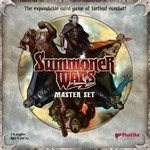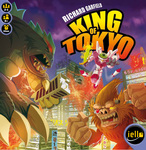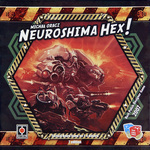

|
As the end of the year approaches, itís a good time to look back at the past year in gaming. 2011 got off to a disappointing start with a slew of underwhelming Nurnberg releases that I discussed back in June. Fortunately, the year recovered nicely during the summer and fall from the earlier depths of Artus, Strasbourg, and Pergamon. 2011 was helped out nicely by the belated yet very welcome release of the Master Set for Summoner Wars, along with a nice Essen crop in October, featuring great Czech, Polish, and French designs to complement the German staples. And of course 2011 has been capped off by the 2nd edition of War of the Ring finally being released, which should help get this masterpiece into many more hands and onto many more tables. While itís too early to pick a game of the year since there are still new releases to be tried and many to be played at least a few more times, Iíll handicap some early favorites along with a brief look through the games that saw the table most frequently.
Potential Games of the Year
 The Summoner Wars: Master Set is my early leader for 2011 game of the year. I realize this is somewhat suspect since earlier versions of the game were originally released back in 2009, but the game has really come into its own with the release of the Master Set. The much improved components (namely the board) nicely complement the increasingly diverse array of faction decks introduced in the Master Set. The underlying system was there in 2009, but the fully realized award worthy game didnít arrive until 2011.
The Summoner Wars: Master Set is my early leader for 2011 game of the year. I realize this is somewhat suspect since earlier versions of the game were originally released back in 2009, but the game has really come into its own with the release of the Master Set. The much improved components (namely the board) nicely complement the increasingly diverse array of faction decks introduced in the Master Set. The underlying system was there in 2009, but the fully realized award worthy game didnít arrive until 2011.
With 19 plays of Summoner Wars already and many more to come surely, itís easy to understand why it needs to be in the game of the year conversation. With so few games hitting 10 plays ever, let alone in the year theyíre released, Summoner Wars clearly has that special hook that makes it addictive and replayable. Iíve previously gone into some detail on my feelings, mostly positive and some critical, on Summoner Wars as appended to Mark Jacksonís review of the game, so I wonít repeat myself here. Suffice it to say, Iím on the Summoner Wars bandwagon despite my longstanding desire to avoid games with many expansions ever since quitting Carcassonne expansions years ago. The blend of long-term strategic decisions and short-term tactical decisions is excellent, and the urge to play again and again with different faction match-ups is powerful.
 However, Summoner Wars is not alone in the game of the year conversation. Two more traditional German-style games are in the running as well, although one is from Poland and the other from the Czech Republic. The first is City Tycoon, which Iíve only played 4 times, but which has come out of nowhere to really impress me. Even with a list of 27 games from Essen that I wanted to try, City Tycoon wasnít on the list and ended up potentially being my favorite game from the new crop. Iíve heard the game compared to the classic video game Sim City by some folks and thatís really not too far off. Itís a tile drafting game where you take turns adding buildings to a communal city and then operating your buildings by transporting electricity and water to them. Ultimately itís simply an affair of turning money into victory points, more money, or goods (which of course can be used to get money or victory points). But the game is wrapped in a nice 4-round package that is dense with decisions and engaging throughout. City Tycoon is the dark horse candidate for game of the year in my book.
However, Summoner Wars is not alone in the game of the year conversation. Two more traditional German-style games are in the running as well, although one is from Poland and the other from the Czech Republic. The first is City Tycoon, which Iíve only played 4 times, but which has come out of nowhere to really impress me. Even with a list of 27 games from Essen that I wanted to try, City Tycoon wasnít on the list and ended up potentially being my favorite game from the new crop. Iíve heard the game compared to the classic video game Sim City by some folks and thatís really not too far off. Itís a tile drafting game where you take turns adding buildings to a communal city and then operating your buildings by transporting electricity and water to them. Ultimately itís simply an affair of turning money into victory points, more money, or goods (which of course can be used to get money or victory points). But the game is wrapped in a nice 4-round package that is dense with decisions and engaging throughout. City Tycoon is the dark horse candidate for game of the year in my book.
The third contender on my list is Vladimir Suchyís Last Will. Iíve had the pleasure of playing the game 5 times so far and am eager for my copy to arrive so I can keep competing to throw away my fortune as fast as possible on carriage rides and thieving butlers. Suchyís games keep getting better and better, and Last Will is no exception. The words that come to mind to describe Last Will are fresh and tense. Itís fresh because it feels new and different, even though thereís nothing revolutionary about the mechanisms employed in the game, they are put together in a highly thematic package that evokes a sense of playing something unique. Itís tense because you are racing to outspend your opponents who you constantly feel are spending faster than you. Youíre up against the figurative clock and never feel as if youíre spending enough money with your precious few actions and turns.
 Lastly, I have to say that two other games may enter this conversation in the next few months. Much has been written about the iconoclast that is Risk Legacy. I wonít revisit all of the hubbub and turmoil inspired by the gameís fairly radical approach to keeping the experience fresh, but I will say that the game is FUN! My group has played the game 5 times so far and weíre scheduled to get through 15 games by the end of February, which is supposedly the number needed for the game to run its course. So far I am having a total blast. It brings back a lot of nostalgic memories, but in a package that has clearly been modernized and refined to cater to gamers today. The game is fast and furious, itís rife with smack-talk, and itís the perfect vehicle for kicking back with a beer and rolling some dice. Itís hard to come up with reasons that Risk Legacy shouldnít be game of the year, except that itís so unusual, which in the end may be the reason that it deserves to win. Tournay is the other game that may enter this game of the year conversation. Iíve only played it once and am eagerly awaiting my copyís imminent arrival so I can try it again to see how it holds up. For now Iíll just say that itís a relatively quick card game of building a city tableau to earn money and points, while avoiding punishing events, that has almost no resemblance to the much-lauded Troyes (which is actually a great attribute in my book).
Lastly, I have to say that two other games may enter this conversation in the next few months. Much has been written about the iconoclast that is Risk Legacy. I wonít revisit all of the hubbub and turmoil inspired by the gameís fairly radical approach to keeping the experience fresh, but I will say that the game is FUN! My group has played the game 5 times so far and weíre scheduled to get through 15 games by the end of February, which is supposedly the number needed for the game to run its course. So far I am having a total blast. It brings back a lot of nostalgic memories, but in a package that has clearly been modernized and refined to cater to gamers today. The game is fast and furious, itís rife with smack-talk, and itís the perfect vehicle for kicking back with a beer and rolling some dice. Itís hard to come up with reasons that Risk Legacy shouldnít be game of the year, except that itís so unusual, which in the end may be the reason that it deserves to win. Tournay is the other game that may enter this game of the year conversation. Iíve only played it once and am eagerly awaiting my copyís imminent arrival so I can try it again to see how it holds up. For now Iíll just say that itís a relatively quick card game of building a city tableau to earn money and points, while avoiding punishing events, that has almost no resemblance to the much-lauded Troyes (which is actually a great attribute in my book).
Note: A late-breaking addition is Eclipse, which I didnít try for the first time until after Iíd drafted this piece. While a single play is far from enough to get a good sense of the game, Iím eager to play at least a few more times and I have a feeling it could become a contender for 2011 game of the year. Thereís a lot going on in this space combat game, but I already know Iím at least a fan of the fact that it encourages combat (like Nexus Ops) rather than turtling (unlike Twilight Imperium 3). Comparisons to Through the Ages seem a bit tenuous, but the resource gathering and management mechanisms are at least vaguely similar and nicely implemented. Eclipse is definitely one to watch in addition to all those discussed above.
Twelve Months of Gaming
I played 328 different games (and expansions) in 2011 a collective total of 792 times. So I played each different game an average of only 2.4 times, although I did have the chance to play 34 different games at least five or more times in the year. In past years, Iíve tended to play games like Crokinole, Loopiní Louie, Dominion, Fairy Tale, Werewolf, and the like at least 25 or more times in a year, but this year was a different story with only one game exceeding the 25 play mark. Hereís the full list of my 10 most played games from the year:
These range from 33 plays of Netrunner down to 9 plays of A Few Acres of Snow. Some honorable mentions that just missed the cut include Galaxy Trucker, Luna, Sun Sea & Sand, and Hansa Teutonica. I was also happy to get in 6 plays each of a nice crop of longer games, those being Dominant Species, Twilight Struggle, and Sid Meierís Civilization (FFG/Wilson version).
 Netrunner was my most played game of the year after picking up a starter box near the end of 2010. I missed this CCG back when it first came out, but was introduced to it in 2010 and quickly tracked down some cards to be able to play more. The system is really brilliant, although Iím certainly partial to asymmetric games and this one has that quality in spades. The differing play styles of the runner and the corporation are the biggest attraction of the game to me, but the bluffing and psychological element of it is also particularly pronounced for a CCG. While praising Netrunner, I also wanted to mention that Richard Garfield designed a 2011 release Ė King of Tokyo Ė that has been a pleasant surprise in my handful of plays so far. Itís a light dice game done right so if youíre looking for something in that vein then be sure to check it out.
Netrunner was my most played game of the year after picking up a starter box near the end of 2010. I missed this CCG back when it first came out, but was introduced to it in 2010 and quickly tracked down some cards to be able to play more. The system is really brilliant, although Iím certainly partial to asymmetric games and this one has that quality in spades. The differing play styles of the runner and the corporation are the biggest attraction of the game to me, but the bluffing and psychological element of it is also particularly pronounced for a CCG. While praising Netrunner, I also wanted to mention that Richard Garfield designed a 2011 release Ė King of Tokyo Ė that has been a pleasant surprise in my handful of plays so far. Itís a light dice game done right so if youíre looking for something in that vein then be sure to check it out.
Neuroshima Hex and Summoner Wars dominated much of my table time this past year as well. I finally picked up a physical copy of Neuroshima Hex after thoroughly enjoying the iPod app for some time now. Itís a game that has continued to grow on me with successive plays, even with around 40 digital games under my belt and now almost 20 physical plays too. The expansion armies are a real treat too because each one introduces many more match-ups to try and a few new abilities to enjoy, while still fitting seamlessly into the base game.
 Itís not a surprise that quick games like Tier auf Tier, Biblios, Jungle Speed, Forbidden Island, and sadly 7 Wonders dominate my most played games list. Despite its flaws, Iím hoping that Kingdom Builder replaces 7 Wonders as the filler du jour next year. I am happy to see Factory Fun up there because despite many in my game group nicknaming it Factory Unfun, I am a died-in-the-wool fan of the game. I am thrilled with the Z-Man reprint, including the larger pipes and advanced player boards (even if the variable machine input/output sizes were better in theory than in practice). Lastly, A Few Acres of Snow is an odd one because it followed quite a steep trajectory of increasing in my estimation throughout the first four or five games and then suffering a steep drop off in games six through nine as I became disillusioned with the game. The strategic flexibility that I once saw began to feel more and more confining. The errors and sloppiness of the production began to grate ever more. In the end, I see it as a big step in the right direction for deck-building games because it uses the mechanism as a means rather than an end in and of itself. Too many deck-building games are simply deck-builders with no other purpose or game included, but at least A Few Acres of Snow will hopefully open designersí eyes to the fact that the mechanism can be used as a piece of a larger game. Vlaada Chvatil also thankfully appears to understand this as seen in Mage Knight.
Itís not a surprise that quick games like Tier auf Tier, Biblios, Jungle Speed, Forbidden Island, and sadly 7 Wonders dominate my most played games list. Despite its flaws, Iím hoping that Kingdom Builder replaces 7 Wonders as the filler du jour next year. I am happy to see Factory Fun up there because despite many in my game group nicknaming it Factory Unfun, I am a died-in-the-wool fan of the game. I am thrilled with the Z-Man reprint, including the larger pipes and advanced player boards (even if the variable machine input/output sizes were better in theory than in practice). Lastly, A Few Acres of Snow is an odd one because it followed quite a steep trajectory of increasing in my estimation throughout the first four or five games and then suffering a steep drop off in games six through nine as I became disillusioned with the game. The strategic flexibility that I once saw began to feel more and more confining. The errors and sloppiness of the production began to grate ever more. In the end, I see it as a big step in the right direction for deck-building games because it uses the mechanism as a means rather than an end in and of itself. Too many deck-building games are simply deck-builders with no other purpose or game included, but at least A Few Acres of Snow will hopefully open designersí eyes to the fact that the mechanism can be used as a piece of a larger game. Vlaada Chvatil also thankfully appears to understand this as seen in Mage Knight.
In conclusion, I take back what I said about 2011 being disappointing. Any year that gives us Sand Goblins, Swamp Orcs, and Shadow Elves must be a good year. Itís a year that has given us not only great classic games like City Tycoon, Last Will, and Tournay, but also great innovative games like Summoner Wars: Master Set and Risk Legacy. Thereís thoughtful games in there and pure fun to be had as well. I canít ask for much more than that in a year of gaming.
(See The Opinionated Gamers for this column plus additional comments on it)